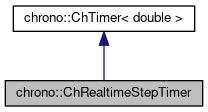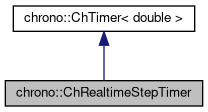Description
Class for a timer which attempts to enforce soft real-time. Two different mechanisms are provided: 1) Spin(), spins in place waiting for real time to catch up with the simulation time. 2) SuggestSimulationStep(): returns a suggested value for the integration step size based on the wall clock time required for completing the previous iteration of the simulation loop. The first mechanism is the standard way of enforcing soft real time. The mechanism implemented through SuggestSimulationStep has the drawback of changing the integration step size in an uncontrollable manner thus resulting in slightly different results on different platforms or at different runs. It is kept for backward compatibility.
#include <ChRealtimeStep.h>


Public Member Functions | |
| ChRealtimeStepTimer () | |
| Create the timer (outside the simulation loop, preferably just before beginning the loop) | |
| void | Spin (double step) |
| Call this function INSIDE the simulation loop, just ONCE per loop (preferably as the last call in the loop), passing it the integration step size used at this step. More... | |
| double | SuggestSimulationStep (double max_step=0.02, double min_step=std::numeric_limits< double >::epsilon()) |
| Call this function INSIDE the simulation loop, just ONCE per loop, to get the suggested time for the next integration time step. More... | |
 Public Member Functions inherited from chrono::ChTimer< double > Public Member Functions inherited from chrono::ChTimer< double > | |
| void | start () |
| Start the timer. | |
| void | stop () |
| Stops the timer. | |
| void | reset () |
| Reset the total accumulated time (when repeating multiple start() stop() start() stop() ) | |
| unsigned long long | GetTimeMilliseconds () const |
| Returns the time in [ms]. More... | |
| unsigned long long | GetTimeMillisecondsIntermediate () const |
| Returns the time in [ms] since start(). It does not require stop(). | |
| unsigned long long | GetTimeMicroseconds () const |
| Returns the time in [us]. More... | |
| unsigned long long | GetTimeMicrosecondsIntermediate () const |
| Returns the time in [us] since start(). It does not require stop(). | |
| double | GetTimeSeconds () const |
| Returns the time in [s], with real_type precision Use start()..stop() before calling this. | |
| double | GetTimeSecondsIntermediate () const |
| Returns the time in [s] since start(). It does not require stop(). | |
| double | operator() () const |
| Get the last timer value, in seconds, with the () operator. | |
Member Function Documentation
◆ Spin()
|
inline |
Call this function INSIDE the simulation loop, just ONCE per loop (preferably as the last call in the loop), passing it the integration step size used at this step.
If the time elapsed over the last step (i.e., from the last call to Spin) is small than the integration step size, this function will spin in place until real time catches up with the simulation time, thus providing soft real-time capabilities.
◆ SuggestSimulationStep()
|
inline |
Call this function INSIDE the simulation loop, just ONCE per loop, to get the suggested time for the next integration time step.
If the previous simulation step was completed fast enough, this function will suggest a corresponding small value for advancing the simulated time; vice-versa, it will return higher values (up to a maximum 'max_step' limit) if the simulation goes slow because of high CPU overhead. If the clamping value of 'max_step' is not reached, the real-time and simulated time should always match. There is also an optional 'min_step' value, to avoid too small of an integration step.
- Parameters
-
max_step upper limit for step min_step lower limit for step
The documentation for this class was generated from the following file:
- /builds/uwsbel/chrono/src/chrono/core/ChRealtimeStep.h
